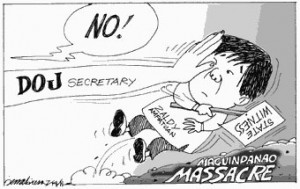I WAS shocked to read the headline “Davao judge ‘shoots’ the sheriff,” and the subheading “Demolition was illegal says the judge who ordered it.” (Inquirer, 7/9/11) The carabao mascot even commented: “Nilaglag ni judge ang sheriff.” The news report falls far short of the Inquirer’s usual standards of truth and accuracy.
I did not ”shoot” the sheriff, even in a metaphorical sense. I explicitly stated my belief that the sheriff was just following the order of the judge who issued the writ of demolition. It is terribly unfair to ascribe any wrongdoing on the part of the sheriff who was merely following the order of the judge. Please do not make a villain out of sheriff Abe Andres, who is in fact the victim in this whole affair.
I was not the one who issued the writ of demolition. If the Inquirer reporter had even bothered to read the local newspapers, she would have realized that it was Judge Emmanuel Carpio, the presiding judge of RTC Branch 16 who issued the writ of demolition, not I.
When I was asked by the Inquirer reporter if I agreed with the statement of Vice Mayor Rodrigo Duterte that the provisions of Republic Act 7279 were not followed in the implementation of the writ of demolition, I answered in the affirmative after I checked the law itself. I personally had not read nor heard the vice mayor’s statement, but I agreed that the provision of RA 7279 required 30 days’ notice before the writ may be implemented; I did not say that the writ of demolition was illegal.
My agreement with the statement of the vice mayor should not be interpreted to mean that I condoned the action taken by the informal settlers (of throwing rocks and shooting projectiles at the demolition team and the policemen), or the reaction of Mayor Sara Duterte-Carpio which we all saw on TV.
For the record, I asked the Inquirer reporter if she could show me the draft of what she would report, so that I could make corrections if necessary. She flatly refused my request, saying that it was not permitted by the editor. I was surprised by her refusal, considering that I freely agreed to the interview, but I did not insist. My worst fears were confirmed by the publication of that story.
—ISAAC G. ROBILLO JR.,
executive judge, Regional Trial Court,
11th Judicial Region,
Republic of the Philippines
Manila-based reporter Julie Aurelio only wrote the story’s last four paragraphs which did not deal with Judge Robillo’s interview. —Ed.


